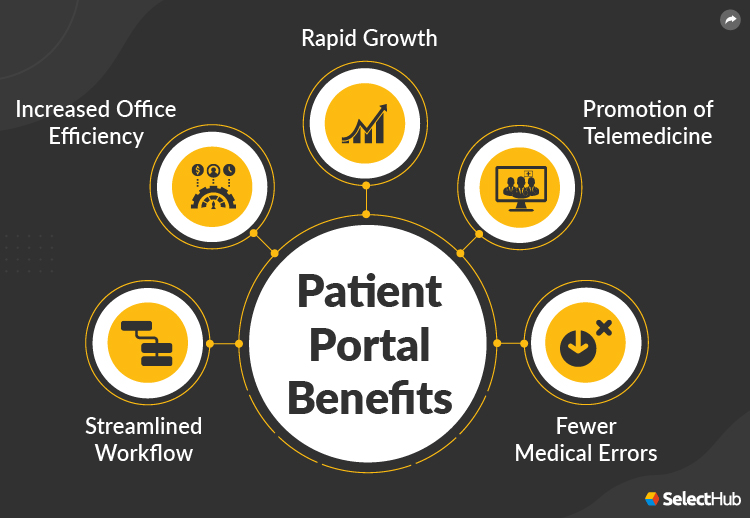Benefits of Patient Portals
Welcome to our comprehensive guide on the benefits of patient portals. In this article, we will explore the various advantages of using patient portals and how they can improve healthcare delivery. Patient portals have gained significant popularity in recent years due to their ability to enhance communication, streamline administrative processes, and empower patients to actively participate in their healthcare journey.
Enhanced Communication
One of the primary benefits of patient portals is the improved communication between healthcare providers and patients. Through secure messaging features, patients can easily reach out to their healthcare providers, ask questions, and receive timely responses. This eliminates the need for lengthy phone calls or waiting for appointments, allowing for efficient communication and quick resolution of concerns.
Convenient Access to Health Information
Patient portals provide a centralized platform where patients can access their health information conveniently. From lab results to medication lists, patients can view and download their medical records at any time. This easy access to health information enables patients to stay informed about their conditions, track their progress, and make well-informed decisions regarding their healthcare.
Efficient Appointment Management
With patient portals, scheduling and managing appointments becomes hassle-free. Patients can request appointments, view available time slots, and even cancel or reschedule appointments as needed. This not only saves time for both patients and healthcare providers but also reduces the chances of missed appointments, leading to better overall healthcare delivery.
Secure Document Sharing
Another significant advantage of patient portals is the secure document-sharing functionality. Patients can securely transmit important documents such as medical history, insurance information, or consent forms to their healthcare providers. This eliminates the need for faxing or mailing documents, ensuring a faster and more secure exchange of information.
Engagement in Personal Healthcare
Patient portals empower individuals to actively engage in managing their healthcare. Through features like personalized health goals, educational resources, and medication reminders, patients can take charge of their well-being. This increased engagement leads to better adherence to treatment plans, improved health outcomes, and a stronger patient-provider relationship.
Efficient Prescription Management
By using patient portals, individuals can conveniently request prescription refills online. This eliminates the need for phone calls or visits to the healthcare provider’s office, saving time and effort for patients. Additionally, patients can access their medication history, dosage instructions, and potential side effects, ensuring safe and informed use of prescribed medications.

In conclusion, patient portals offer numerous benefits that enhance healthcare delivery and patient engagement. From improved communication to convenient access to health information, patient portals empower individuals to actively participate in their healthcare journey. By leveraging the advantages of patient portals, healthcare providers can streamline administrative processes, improve patient outcomes, and ultimately deliver high-quality care. Embracing patient portals is a step towards a more patient-centered and efficient healthcare system.
Frequently Asked Questions about the Benefits of Patient Portals
1. What is a patient portal?
A patient portal is a secure online website that allows patients to access their personal health information and communicate with their healthcare providers.
2. What are the benefits of using a patient portal?
Using a patient portal offers several benefits, including:
Convenient access to medical records
Ability to schedule appointments online
Secure messaging with healthcare providers
Access to test results and lab reports
Ability to request prescription refills
3. Are patient portals secure?
Yes, patient portals are designed with strong security measures to protect patient information. They use encryption and secure logins to ensure data privacy.
4. Can I view my test results through a patient portal?
Yes, patient portals provide a convenient way to access your test results and lab reports. You can view them online and discuss any concerns with your healthcare provider.
5. How can a patient portal improve communication with my healthcare provider?
A patient portal allows you to securely message your healthcare provider, eliminating the need for phone calls or in-person visits for non-urgent matters. This improves communication and saves time for both patients and providers.
6. Can I request prescription refills through a patient portal?
Yes, patient portals often have a feature that allows you to request prescription refills. This saves you from having to call or visit your healthcare provider’s office for routine medication refills.
7. Can I schedule appointments through a patient portal?
Absolutely! Patient portals usually offer online appointment scheduling, allowing you to choose a convenient date and time without having to make a phone call.
8. Is there a cost to use a patient portal?
In most cases, patient portals are provided by healthcare organizations free of charge to their patients. However, it’s always a good idea to check with your specific healthcare provider to confirm if any fees are involved.
9. Can family members access a patient portal on behalf of the patient?
Some patient portals allow designated family members or caregivers to access the portal on behalf of the patient. This can help manage the healthcare of dependent family members.
10. How do I sign up for a patient portal?
To sign up for a patient portal, you will need to contact your healthcare provider’s office. They will provide you with the necessary instructions and access credentials to create an account.




